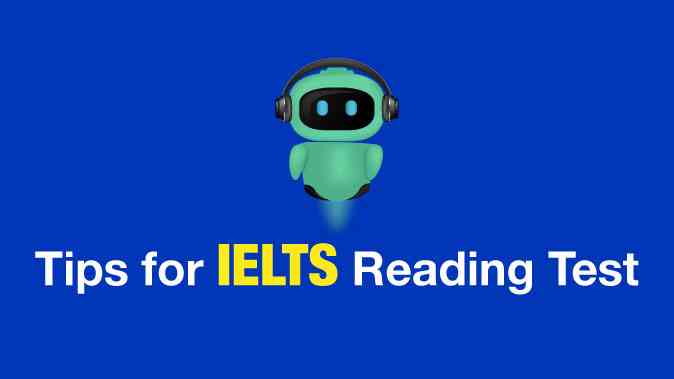How to improve reading skills for IELTS?


The IELTS reading section is the second part of the IELTS test, which takes place immediately after the listening section. The difficulty with the IELTS reading section is that you need to understand a large amount of text in a short amount of time and answer questions about what you are reading accurately.
This is especially true for the academic part of the test, as it displays more difficult text. Here are 10 tips for getting a high score in the IELTS Reading section.
1. Read as many different English texts as you can: One of the best ways to improve your reading comprehension is to read as much as you can. Try to expose yourself to as many English reading things as you can, be it books, newspapers, articles, online publications, academic materials, and social media. As you are exposed to various written content, it will improve your reading skills and help develop your vocabulary.
2. Don't make reading your single study tactic: The reading is designed to test your ability to determine what is important information. One of the useful exercises is to create questions for yourself. Find the article you are interested in. As you do this, take note of the most important information. Then, formulate questions from the article you read.
3. Learn unknown words: When reading, try to create the habit of emphasising unknown words and phrases. Then check what they mean. This will prevent you from encountering unknown words during the actual test.
4. Try reading the question first: Before reading the text in the reading section, first look at the question. Knowing the questions in advance will help you know what to look for while reading, as they are directly related to the passage. After reading the passage, read the question again. This determines which section of the passage needs special attention.
5. Remember that spelling is important: If the answer is misspelt, it will be marked as incorrect. The good news is that you won't lose points with the wrong answer. So if you don't know how to spell a word, just do your best. You might get it right!
6 Beware of pitfalls: The reading section is designed to test your reading comprehension, some of which means paying attention to what you’re reading. Some questions are designed to trick you into thinking that you have a clear answer. Always read your answers and make sure they are doing what the question is asking for. Don't get caught in a trap!
7. Labelling diagrams: During the reading test, you may be asked to label diagrams. The good news is that you can find the words you need in your text. As mentioned above, spelling is important, so make sure you copy exactly the words you need.
8. Emphasise important information: The reading section asks you to process a lot of information in a short amount of time. Underline and circle important words and phrases to make your work easier.
9. Divide the time evenly between the passages: The reading test asks you to answer questions about three different passages. We recommend that each passage take 20 minutes. This doesn't seem like much time for a passage, but keep in mind that it only takes an hour to complete the reading section. By evenly dividing the time into all three passages, you can maximise your overall chances of success.
10. More tips to remember:
-Don't leave any empty space, as you won't lose points with the wrong answer.
-Take notes on the question sheet, but keep in mind that only the answer sheet will be marked.
-You’ll be writing in pencil, so remember to bring an eraser.
-For true / false questions, you can write "T" or "F" instead of "true" or "false".
-Questions are not always straight. That is, the process of answering a question does not require a start and end point.
Hopefully these tips will be of help. Good luck in the IELTS reading section.
You don't have to struggle alone, you've got our assistance and help.